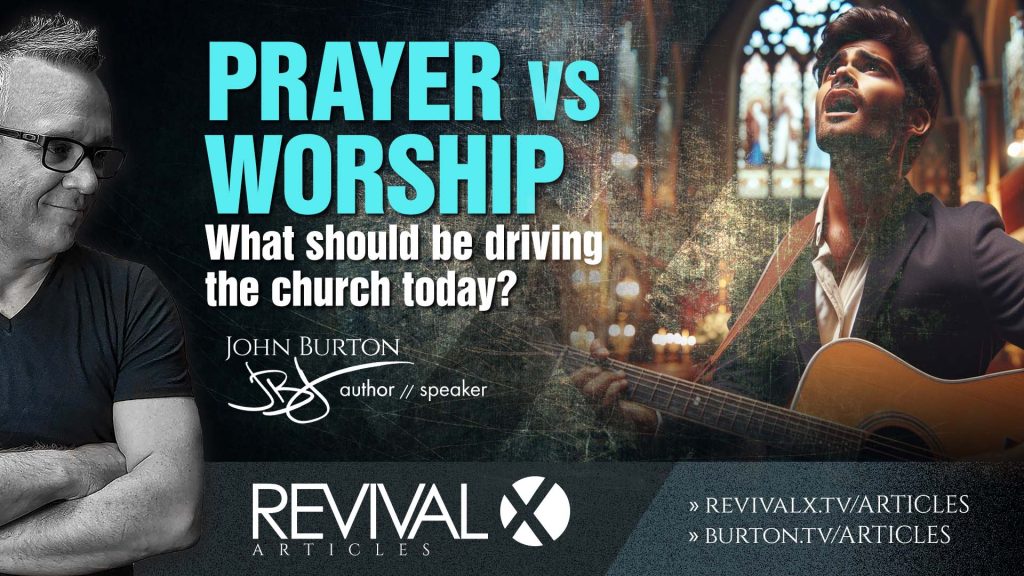Prayer-Driven vs. Worship-Driven Churches: The Great Debate
What's on people's church shopping lists?
Listen to the podcast:
The validity of “church-shopping” is a discussion for another day. Suffice it to say, people do it, and they have their lists.
Powerful worship, excellent teaching, a powerful youth ministry and dynamic children's ministry are in the top ten, if not the top five of all-time desires in a church experience. After all, what else is needed? You have deep, overwhelming, supernaturally charged worship and excellence in teaching and family ministries. Based covered.
Oops. We forgot something. Don't fret, though. It's been forgotten for quite some time, especially in today's church.
Intercession. Tongues of fire. Contending in unified decrees, declarations, warfare and passionate eruptions of oracles from heaven. You know, prayer.
DO PASTOR'S EVEN CARE?
In my early years of ministry, I was never asked about my prayer life or intercession strategies when interviewing for open church staff positions.
Many pastors (thankfully, not all) are uncomfortable in the prayer room and will either eliminate it from the culture of the church or minimize it to something less threatening. At best you'll find a group of faithful warriors praying in a glorified janitor's closet down a dark hallway in the church prior to the service. The pastor doesn't typically lead the meeting, much less attend it or even promote it.
If worship is strong and teaching is effective and other ministries are growing, all is well. Sure, they may say prayers at times, but a firehouse of burning intercession is a foreign concept.
WHY WORSHIP IS ADORED AND PRAYER IS A STRUGGLE
ONE: It's all about the experience
If we aren't careful, worship can become more about us than about Jesus. As I'm writing this, I'm pumping my spirit with worship music. Like many, I absolutely love anointed music whether it's in my headphones or in the sanctuary. It's enjoyable. It's edifying. It's emotional.
Prayer, on the other hand, can often be difficult. The cost is greater and the energy necessary to push through can be extreme. Of course, there are different modes of prayer including soaking, meditation, petition and others. From my experience, the greatest impact both for the church and for the individual comes when there's a healthy dose of strategic, informed, prophetic intercession, decrees, declarations and warfare. The breaking power of such prayer is intense.
The tender connection with the Holy Spirit that we might get with musical worship often shifts to a raging internal fire that demands mountains be moved and darkness be invaded. Of course, we aren't choosing between worship and prayer. We need churches to be driven strategically by both with prayer as the foundation.
TWO: There's a lack of equipping in prayer
Worship is easy to understand. Surrender, love, adore and exalt as some beautiful and anointed music fills the room. I'm not saying it always easy to enter in, but the concept of worship is easy to grasp.
The purpose and function of strategic prayer? Not so much.
We need training in what I call Revelation Driven Prayer. How do we hear God's voice? How do we declare prophetically what he's saying? What do we see in Scripture? How should we not prayer? What are the roadblocks?
Exhausting, right? As a prayer freak, I'll admit that it can be a battle. Often it's a war. I've wasted a lot of time and energy in prayer over the years by not praying correctly. If prayer is to be foundational in our churches, equipping in prayer must be equally foundational.
THREE: There's no vision
The concept of “having a vision” isn't something many people think about. Often, people go to church largely based on their desires, not their God-given vision for advancing the Kingdom. Again, they want a satisfying experience with great worship and great ministry. There's nothing inherently wrong with that, though it's tragically limiting. There's so much more.
When prayer-driven churches gather, the focus isn't mostly on giving the people a nice Sunday experience. They have gathered with war in mind. The vision is too intense to be okay with anything less than conquest. Plundering Hell and contending for revival consume their thoughts. Such a vision demands prayer at a level few would ever sign up for.
FOUR: Prayer can be deflating
Regular people don't want to be part of a church that struggles to punch through into the miraculous. Remnant Believers do, however.
A vision of intercession has built into it a resolve to keep pressing, keep prophesying, keep standing in faith until the breakthrough comes. If quick growth, instant wonders and visible impact are required to stay faithful in the place of prayer, most will quit. This is why churches often have to keep the hype going. We need the dopamine hits and the adrenaline rush every Sunday.
FIVE: Tongues are rare
Groans of intercession are required if we want to pray, walk and live in the supernatural. This type of corporate expression is rare as pastors accurately predict that many would run for the exits should it explode in the church.
The Holy Spirit must be invited to rage in our gatherings again! Baptisms in power must be non-stop as people become infused with an other-worldly language of intercession!
PRAYER-DRIVEN CHURCHES ARISE
I've campaigned for churches to eliminate all ministry for at least six months – except for prayer. Bring the worship team down from the platform. Call the youth and children into the auditorium. Shut down everything except for fiery, prophetic prayer in every service and see what happens.
When we return prayer to first place in the church, everything else will start to calibrate with God's design and the power of the Holy Spirit will again manifest.

